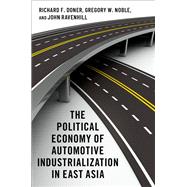East Asia is a powerhouse of automobile production. Yet, across the region, national automobile industries have had strikingly different patterns of development. Despite starting from equally low levels of performance and initially similar strategies, countries have experienced vastly different results. From Thailand's success as an assembly hub for foreign automakers and China's unexpected achievements in building its own car industry, to South Korea's impressive development of an integrated industry, to the Philippines' persistent weakness, these divergent paths offer a fascinating window into the determinants of economic growth.
The Political Economy of Automotive Industrialization in East Asia provides a political explanation for why development strategies and performance have been so uneven within one of the world's most important regions. Utilizing interviews and original-language research from multiple nations, this book explains that factors such as market size and neoclassical economic policies alone cannot explain these patterns of development. Richard F. Doner, Gregory W. Noble, and John Ravenhill instead highlight the significance of two sets of factors: countries' very different capabilities for implementing policies and the political forces that help to explain the emergence of effective institutions. Through cross-national analyses of China, Taiwan, South Korea, Indonesia, Malaysia, the Philippines, and Thailand, the book sets up a clear structure for understanding industrial development and how it enables or constrains the capabilities of domestic firms. Brief comparisons with Brazil, Mexico, and other developing countries confirm the utility of the analytic framework and demonstrate how it is superior both to accounts in mainstream economics and much of political science, which fail to give sufficient emphasis to the role of public and public-private institutions, or provide an explanation of the political bases of those institutions.
In a world where auto assemblers and suppliers are facing new challenges in an ever-evolving industry--such as the transition to electric and autonomous vehicles--this book offers a crucial perspective on the centrality of institutional capacities and political economy. By tracing the divergent trajectories of seven nations, The Political Economy of Automotive Industrialization in East Asia offers lessons beyond the automobile industry that illustrate the broader importance of institutions to economic growth.








